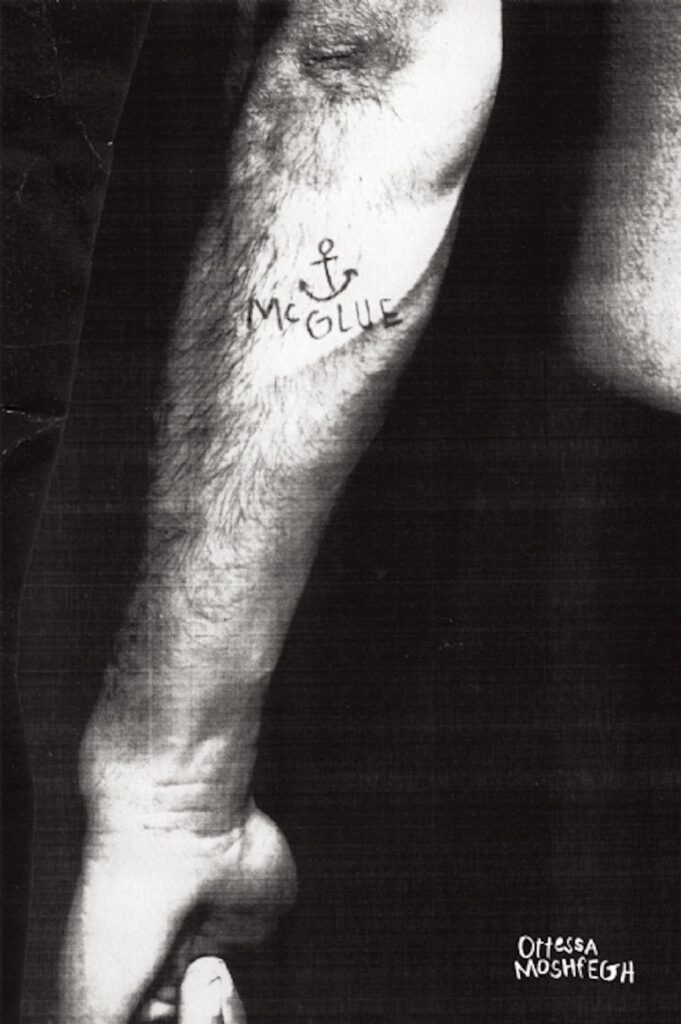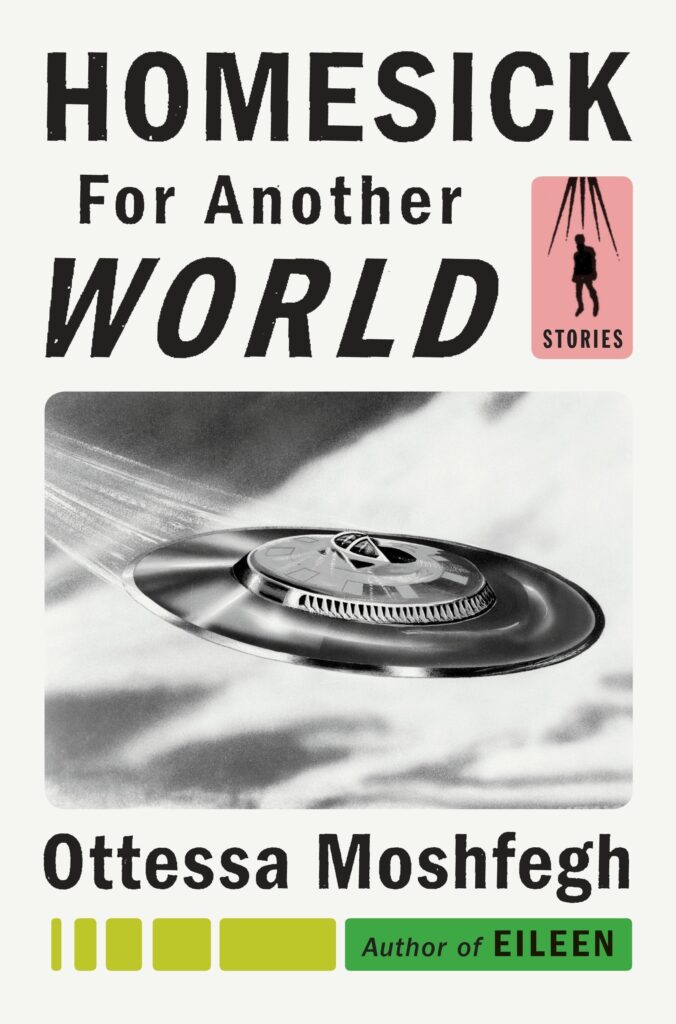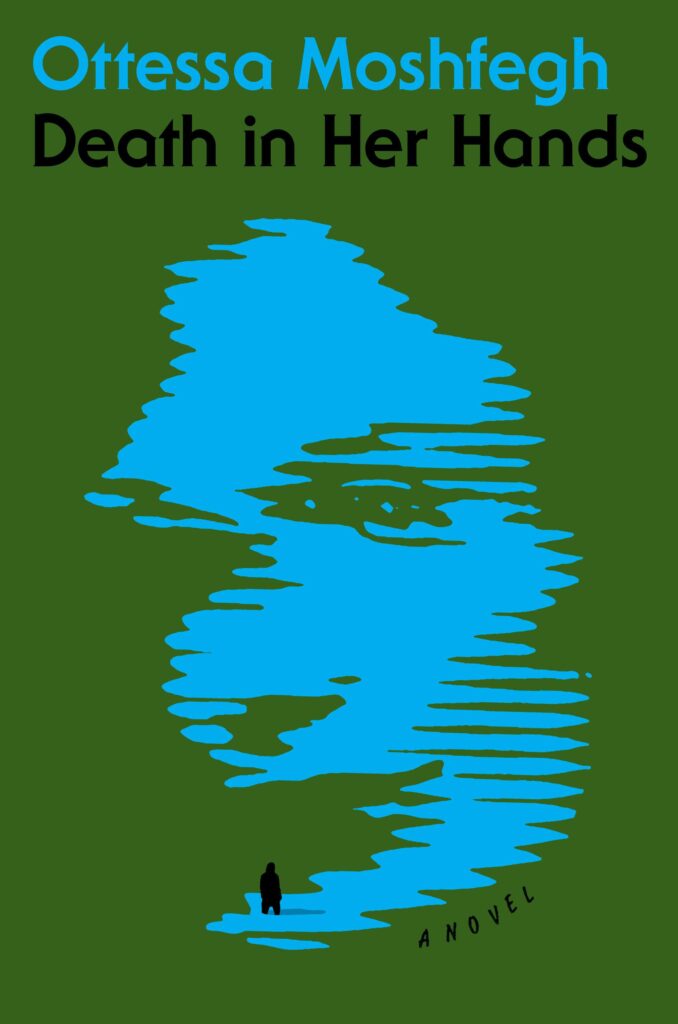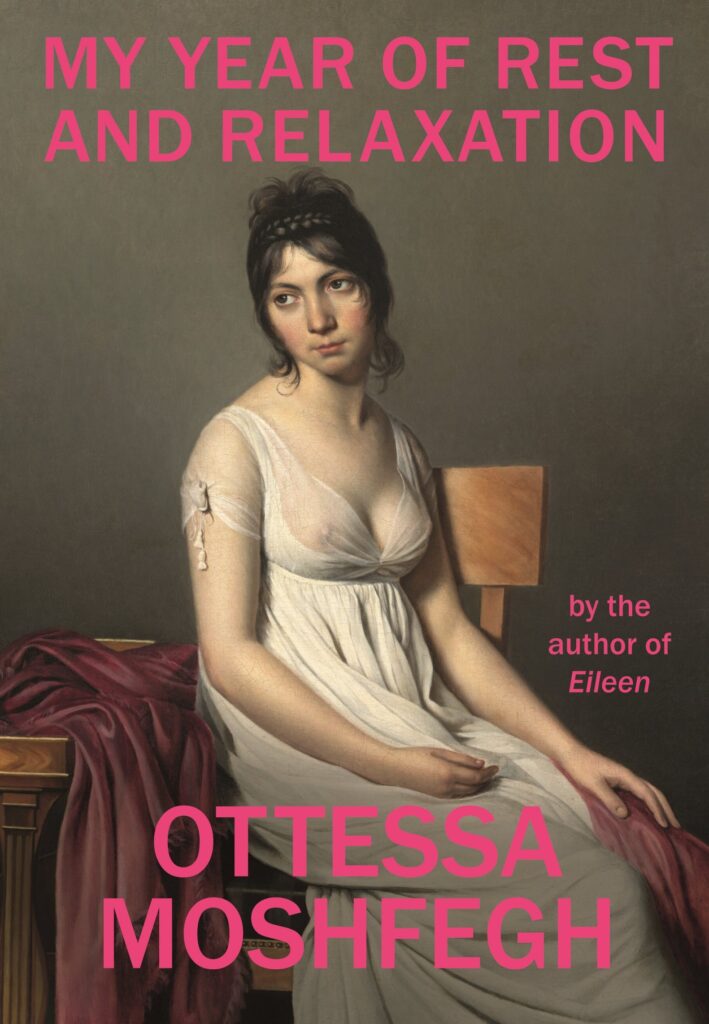“One shouldn’t make art to please or entertain the masses. Real art requires no audience.”
This is from Ottessa Moshfegh’s most recently published short story, “I Was a Public Schooler” (2020), shocking from an author “notorious” for her 2016 confession to having played the “game” to win an audience. Except the words emanate from the mouth of what is surely among the most pathetic, drippy middle-school English teachers ever committed to the page. At the end of the story, he sends its youthful protagonist “a sheaf of hand-copied poems by his seventh-grade students, which he said were so beautiful they made him want to kill himself.”
So the “Real art requires no audience” line, uttered with gravest sincerity by Mount Monosocles’ Mr. Beardsley, does its real work, of course, as a joke—a cutting one at those shocked by the transparency of Moshfegh’s ambition, shocked by the ballsy attitude with which she expressed it. (It’s actually hard to find anyone who’ll own up to such shock. It always seems to be that critic one café table over who got triggered.) Many things set Moshfegh apart as a writer; if one sets her above, it’s her ability to conjure humor in the unlikeliest places. She’s a master not so much of black comedy, as of twilight tales and darker, yet replete with sharp cracks and outright gags—many of which her characters are entirely oblivious to.
That mastery is evident from what stands, more or less, as the beginning. The story originally titled “Disgust” (2012), her first to be published in a recognized literary outlet, follows a fortysomething loner’s preposterous pursuit of a neighborhood divorcée and his simultaneous descent into sexual depravity. At the rock bottom of his corruption, we’re in his head: “This was living, he thought.” This was living—dramatic irony both fierce and blindsidingly funny.
And her dark humor has range. For its appearance in Moshfegh’s splendid collection of short fiction, Homesick for Another World (2017), “Disgust” was renamed for its leading man: “Mr. Wu,” the perfect pun for a grotesquely inept suitor with an incendiary take on shooting your shot. Returning wryly time and again to the untruths we spread and how they fail us, the tears we shed and how we fail them, and the body’s many fluid and not-so-fluid effluvia, Moshfegh has picked up the comedic mantle of her fellow Bay Stater Dane Cook—“We’re all gonna lie, we’re all gonna cry, and we’re all gonna take painful shits”—and made real art of it.

The frequent obliviousness of Moshfegh’s characters to the comedy they generate allows her to make them the target of her humor, but it also points to a more universal, compassionate perspective. Her use of unreliable narrators has been often observed; as Kevin Power writes, “The unreliable narrator, as a technique, appeals to novelists who are interested in the gaps (tragic, comic) that yawn between how we conceive of ourselves and how the world perceives us to be. Moshfegh has toyed with this technique in much of her work.” More than toyed with, it resides at the heart of that work.
Limited to a singular and inevitably self-centered point-of-view, we are all unreliable in the way Power describes; beholden to fallible and innovative memory—that “fickle thing,” to quote a Moshfegh character—we are all unreliable, as well, in filling in the gaps between what really happened, that chimera, and what we make of it. It is all of we real-life characters who are toyed with by unreliability, who are its playthings. Moshfegh reminds us of this in much of what she’s ever written—and in much of the best of it, humor is central. This is the writer, after all, whose most direct published advice to beginning writers is titled “How to Shit.”
The current Moshfegh moment is based in part on her “new” book, the extravagantly meta tale of mystery and mental illness Death in Her Hands (2020); by publication date her third novel, it was in fact fully (if not finally) written and filed away before she composed the best-selling My Year of Rest and Relaxation (2018). The experience of isolation and fear that define the daily existence of Death’s 72-year-old protagonist “echoes,” as one critic writes, “the anxieties and frustrations of life under stay-at-home orders.” But it’s really My Year’s tale of a young Manhattan art-world dropout who chooses to cocoon in her Upper East Side apartment that has made Moshfegh “the unofficial laureate of lockdown.” A propitiously dark time, then, to consider the standout qualities of the artist and the oeuvre.
❧
Moshfegh has flatly stated, “None of my characters are me.” OK. Some might be more her than others, but she does write from vantage points across age and sexual lines more often than most. And perhaps that character who’s had cat scratch fever does have little else in common with her. Oh, but then:
DG [nope, Doug Gordon of Wisconsin Public Radio]: So, if you don’t mind my asking, how much of your characters’ existential insecurities come from your own life.
OM: All of them. A hundred and 10 percent.
Anyway, reading fiction to garner insight into its author puts it all back-asswards. Moshfegh happens to be a very interesting “me” and if you want to find out more about it, you can both respect her claim and enjoy yourself by triangulating with material where her distinctive mix of bluntness and humor shines: that notorious interview; her 2018 autobiographical sketch of her already ballsy 17- and 18-year-old self, “Jailbait”; and her autobiographical sketch of her present-day, then 36-year-old self from the same year, thinly and blithely disguised as a “Letter to the President”:
I wonder if you’d think I have a singular charisma, or if I’m just like all other women of the olive-skinned variety. A woman of vaguely Middle Eastern heritage. The truth is that I’m sometimes pretty, sometimes not, but always beautiful, haha. Can I confess to you that I’m glad I’m only half Iranian? That I’m glad I’m also half Croatian, i.e., white European? That my green-eyed mother has saved me from feeling like the infidel? . . . I don’t cover my hair because, ding dong, I am not a Muslim. My Iranian family were Jews who converted to Bahá’ís. I don’t know anything about Islam except that I like their fussiness with prayer, that they have to keep track of which way the sun sets. These days, we roam around using GPS; most of us have no idea where we are. Am I right?
Come for the raw honesty, feast on that steaming “ding dong.” This is one version of Ottessa at her best, with all her “peculiar grittiness and verve.”
❧
A man, Charles, escapes for the weekend to his parents’ empty country cabin. Amid their bedding, he notices something flesh-toned. “At first I thought what I’d seen was my wife’s old diaphragm—a Band-Aid–colored thing that I’d always hated looking at. Then I thought it might be an old prosthetic arm, or a doll. But when I pulled another blanket back, I saw it was a dildo. A large, curved, Band-Aid–colored rubber dildo. My first instinct, of course, was to pick it up and smell it, which I did.” Of course—gold.
That’s a great gag, and “A Dark and Winding Road” (2013), one of the top stories in Homesick for Another World, has already given us another, deeper one: musing on the cabin’s quietude, Charles relates, “I loved it, or at least I thought I ought to love it—I’ve never been clear on that distinction.” This is both backdoor aphorizing at its cheekiest, and a crystal-cut setup for a story whose payoff is about loving (or something) what you damn well know you oughtn’t.
The year after “A Dark and Winding Road,” Moshfegh came out with her first book, the novella McGlue, an unfunny tale of unrequited love and unremembered murder set in 1851 Salem, far-flung ports, and a merchant ship’s makeshift brig. (1851: the year of Moby-Dick’s publication. As of 2017, Moshfegh professed to never having read it. If she only had, she would have discovered that, despite its fabled gravity, it’s not at all stingy with a jest.) McGlue is a hyperstylized flex, a statement of intent that feels painstakingly crafted to grab attention within the beardiest of literary precincts. The vigorous imagination with which Moshfegh sustains the carefully aged and weathered New England argot of her first-person narrator makes for an impressive display of technique and a taxing read. It’s fine to demand extra effort from your audience, but it warrants a commensurate reward that’s not on offer here. The book ends crisply and keenly, though with no great shakes. A reader might recognize it as poignant, amid relief at having made it through.
For those nights when poignancy’s your thing, Homesick’s “No Place for Good People,” also from 2014, delivers it far more effectively and in about 30,000 fewer words. From early 2015, there’s the quintessential Moshfeghian story, or at least her greatest Dane-ish one: “Nothing Ever Happens Here.” A dusky Hollywood comedy set in a magical version of 1981 where everyone’s heard of Pierce Brosnan, in addition to a lot of lying, a lot of crying, “spittle,” “halitosis,” “Jack Nicholson picking his nose,” “bubbles of sweat,” a “chewed-up wad of gum” shared between scene partners, “rotting corpses” and squirrel carcasses and poodle shit, it features a nifty two-part Hitler joke and this sublime exchange between a hopeless 18-year-old Starsky-cum–Remington Steele wannabe and his horoscope-plagiarizing landlady after another bummer of an audition:
“Stuff the crotch next time,” she said. “You’ll feel silly but you won’t regret it. Half of a man’s power to seduce is in the bulge of his loins.”
“Where’s the other half?” I asked.
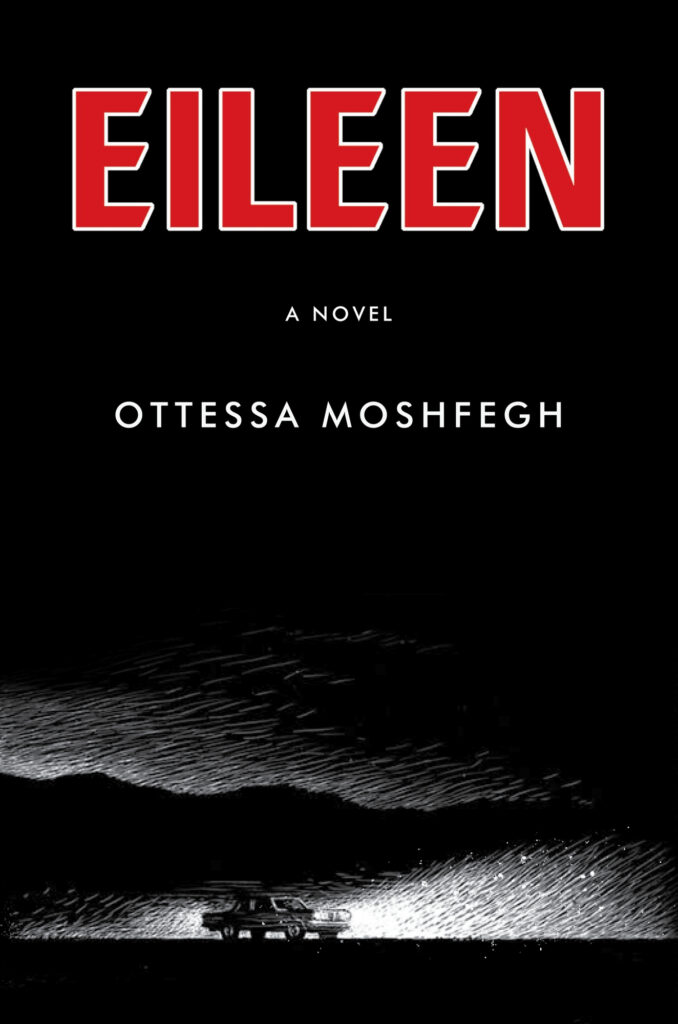
Our literary economy should be able to support any writer who can do that without forcing her into novel writing. It doesn’t, thus Eileen. Released in August 2015, it’s the sort of semidark, fitfully amusing book that those in blurbing circles are apt to call “mordantly funny” and “noir.” If only it actually read like the “fuck-you joke” the Notorious OM said inspired its conception.
Out of a dreary title character with half-cocked notions about escaping her dreary circumstances, Moshfegh does manage to build an attenuated suspense—you can feel the novel driving toward an eruptive conclusion, but it’s a sluggish drive and the scenery’s awfully repetitive. Her prodigious line-by-line talents are on full display; there’s just many more lines than the protagonist justifies (excuse the blunt foreshadowing at the end here—it’s not so leaden in broader context):
Seeing movies has never been a favorite pastime of mine, but that afternoon I craved company. I didn’t like movies for the same reason I don’t like novels: I don’t like being told how to think. It’s insulting. And the stories are all so hard to believe. Furthermore, beautiful actresses always made me feel terrible about myself. I burned with envy and resentment as they smiled and frowned. I understand that acting is a craft, of course, and I have great respect for those who can toss themselves aside and assume new identities—as I have done, one might say. But generally speaking, women on-screen have made me feel ugly and lackluster and ineffectual. Back then especially, I felt that I had nothing to compete with—no real charm, no real beauty. All I had to offer were my skills as a doormat, a blank wall, someone desperate enough to do anything—just short of murder, let’s say—simply to get someone to like me, let alone love me.
Admitted, this is a welcome counterweight to bog-standard reminiscences of “how big the movies made me feel.” But, however well it captures a dreary outlook, it would be more pointed (and feel less verbose) if it were less general and more specific, trenchant example–wise. One suspects that the concision and focus required of a short story would have led Moshfegh to do the job better. Now imagine this outlook and tone dominating a couple hundred pages.
A few months after Moshfegh’s debut novel appeared, she as much as acknowledged the problem with it, even if she blamed that problem on an unconvincing source: “My new work, I hope, . . . at least moves beyond the polarities I’ve set up in Eileen. Eileen is a very black-and-white story. And ultimately, polarity gets boring.”
So that was it: “Polarity.” Really? Moshfegh went on to say, “I’d rather hang out in the gray.” Yet for 90 percent of its length, Eileen is gray as it gets—save for when it’s mildew-green and mold-brown. The true issue is that Moshfegh had yet to find a way to apply her particular talents at novel scope. Meanwhile (fall 2015), she was demonstrating exactly how to get opposites abopping in “Dancing in the Moonlight.” Though it isn’t her tightest, it does feature her finest comedic set piece: a staring contest for the ages that takes advantage of multiple bold polarities. (The story also includes an apropos-of-nothing Queequeg name-drop whose mirth is amped in retrospect by Moshfegh’s Moby-Dick-less disclosure two years hence. Which also, yes, means she’s a legend for her dating of McGlue.)
In two outstanding stories published the following year, Moshfegh again demonstrated what she could accomplish, and each time with only sparing exercise of her comedic strengths. “The Beach Boy” takes not one but two breathtaking turns, each pulled off with exemplary brevity—literary whiplash done right. (To be precise about my physical reactions: the first moment was jaw-dropping, the second gasp-inducing.) And for those confused about what’s “mordantly funny,” it’s this story’s last line. “An Honest Woman” harkens back in theme to what was still known as “Disgust,” but with even greater command and ferocity. The lies a lecherous widower tells are so threadbare they choke off humored reaction. The story features an 11-page scene around a bottle of Kenny May whiskey that sustains a grim and unpredictable intensity which the climax of Eileen had aimed at but only approached. It easily surpasses anything in McGlue, awash with alcohol as that book is.
While Homesick for Another World was released in January 2017, it seems the last of its 14 stories had been completed two years earlier, because in between finishing it and promoting Eileen in the summer of 2015, Moshfegh swiftly produced Death in Her Hands, more as a writing exercise than with an eye toward publication. It went into a drawer, came out during downtime after the Eileen tour, underwent some revisions, went back into a drawer, then came out a second time—there are hints that this second extraction occurred because Moshfegh had become stuck in writing a historical novel set between China and the West Coast. In any event, taking the long view of her writing career, it’s prior to My Year of Rest and Relaxation in any important way.
Moshfegh didn’t say it this time, so I will: Death in Her Hands is boring. There’s little fresh about its self-reflexive approach to the mystery genre, the trendline of its protagonist’s mental disintegration is all too obvious, and, though there are some nice gags, they’re overshadowed—once again, we’re hanging out interminably in the gray.
To identify the big, relatively objective problem with the novel, we can again rely indirectly on Moshfegh’s own words, this time in her appreciative reflections on the young-savage classic Less than Zero: “Subtlety is necessary to satire, but is not prized in the US. We value outgoingness, aplomb, direct attacks and celebrations. We favour straight arrows over innuendo. This is a weakness. Satire is the most difficult mode in literature because it functions with a delicate, invisible layer of self-awareness—which readers often lack.” Self-awareness needn’t always be invisible to serve satire, but in Death in Her Hands it’s laid on with a trowel.
Death is annoying, too. As she did with Eileen, Moshfegh has given Death’s Vesta Gul an internal catchword, a personal shibboleth that signifies her mental remove from the norm. In Eileen’s case, it’s “death mask”—a real phrase with historical resonance and practical application: she uses it to refer to the false face she presents to the world, with connotations that obviously go well beyond “false face.” That’s a good shibboleth. In Vesta’s case, it’s “mindscape”—not quite a real word, and one that could readily be replaced by “mind” in many instances. That’s not such a good shibboleth. There’s some excuse for that: Vesta is not as intelligent as Eileen . . . yet readers are asked to hang out with her for just as long. There’s no excuse for this: whereas “death mask” appears 15 times in Eileen (i.e., a lot), “mindscape” appears a pestiferous 26 times in Death. (One can only hope that Moshfegh’s own use of the word, twice, in an interview last June reflects an allegiance to her character and not the irksome term.)
Death improves toward the end. Past the three-quarter mark, there’s a sequence between Vesta and two neighbors with a nervy tension that stands comparison with “An Honest Woman”’s Kenny May scene. And Moshfegh does it without sacrificing her satirical campaign—rather, she goes full USA, tossing the trowel and rolling in the tanks. Searching for her dog, Vesta trespasses onto her neighbors’ property, has a fainting spell, and is brought inside. After recovering sufficiently for the husband to make clear she’s overstayed her welcome, she reminds them of her quest:
“Did you see any digging? My Charlie likes to dig.”
“We have done our own digging,” the man said curtly. “If there’s any other digging on our property, I’d ask for the holes to be filled.”
“Of course,” I said, gaining my balance again. You’d expect a gentleman to come let me lean on his arm, at least walk me to the door, see me off, but no. He stayed there fingering the high black and white keys of his piano, as though threatening to play something eerie and upsetting. The woman glanced down at the hors d’oeuvres. Out of politeness, I bent down and picked one up—a fragile shard of goat cheese tart. It had honey drizzled on top. I’d thought the goat cheese and honey was an odd combination when I saw the recipe in The Gourmand. But it was tasty. The woman handed me a cocktail napkin. The man played a high, creepy trill, which made both of us jump.
“I guess I should be going,” I said.
No—you’re fun. You can stay.
In the book’s last five pages, events transpire that make it possible to see all that’s gone before in a new light. However unreliable a narrator is, we still expect their relating of events to roughly reflect what they were thinking (or spinning) “at the time.” But there’s a more severely unreliable narrative logic, in which we know or, even better, discover at the end that an entire tale has been shaped—all the drawing of events from memory’s well, all the choices of emphasis and elision—not from the narrator’s perspective moment to moment but from one given moment. To invoke the consummate such moment and one of the greatest North American horror films, this is deathdream storytelling logic. Death in Her Hands doesn’t demand to be taken as a deathdream, but who wouldn’t want to? It’s opening up of that possibility is exciting, an achievement—if one not quite big enough to redeem the preceding slog.
McGlue, Eileen, Death in Her Hands: the three long-form books make a coherent set. Major elements echo across the three pairings:
- McGlue and Eileen: same-sex friendships at the edge of obsession and with an imbalance of power, narrated by the sidekicks
- McGlue and Death in Her Hands: mentally disturbed protagonists try to figure out how they seemingly came to kill their closest companions
- Eileen and Death in Her Hands: tales of suspense related by septuagenarian widows who pointedly live (more or less) alone
While there are characteristically bountiful body secretions and evacuations in all three books, they’re all hampered by a bashfulness around sex in the storytelling—an odd bashfulness, as it’s nowhere evident in Moshfegh’s short works, fictional and non-, from “Medicine,” published in 1997 when she was 26, onward. Yes, the line between authorial bashfulness and a character’s can be difficult to draw with a first-person narrator, as there is in all three. Which is a reason to write in the third person when sex is at stake but the lead character is—or self-identifies as—“bashful” about it, exactly as Moshfegh did in “Mr. Wu.”
McGlue, Eileen, Death in Her Hands: all three have evident virtues, all three end smartly—a most estimable virtue. And I’m sure I’ll never want to read any of them again. By no means are they bad writing, but by Moshfegh’s own metric, neither are they good writing.
❧
My Year of Rest and Relaxation is something else. Though the reader has a solid idea of how it will end about 85 pages in advance, the turns it takes in getting there are both artfully pleasing and entertaining. Moshfegh’s three other long works, despite the varied impulses behind their writing, all share a dutiful sense of structure: this must happen, then this, and so forth, to bring us to here. The question is, Where must this story go? And the answer’s hardly a test. Consigning such structural requisites to a subplot, My Year slips the trap. It takes its protagonist’s bizarre mission, to power-sleep her way over months into a new and better self, prompts the question, Where can this story go?, and away it goes.
My Year handles sex as well as any contemporary novel I can think of: unabashedly, concisely, humorously. It deftly balances the gray and the funny like none of its three big predecessors. And it’s daring enough to make its biggest gag the central plot device: a sleep-aid called Infermiterol that plunges the protagonist into days-long fugues, goes very well with vodka, and would pair ideally with Kenny May.
It’s been widely observed that, among its several levels, My Year is a satire on America’s hypermedicated mental health culture, but no one has yet provided a full accounting of the psychotropic remedies its animal cracker–loving protagonist ingests. This is for you: Ambien, Ativan, Haldol, “Infermiterol,” Lamictal, Librium, lithium, Lunesta, “Maxiphenphen,” melatonin, Miltown, Nembutal, “Neuroproxin,” Noctec, Percocet, Placidyl, primidone, Risperdal, Rozerem, Seconol, Seroquel, “Silencior,” Silenor, Solofton, temazepam, trazodone, “Valdignore,” Valium, Vicodin, Xanax, and Zyprexa, plus, extra-credit reading reveals that her Benadryl, Dimetapp, NyQuil, Robitussin, and Theraflu all contain an ingredient that renders them disocciative hallucinogens at high volume. This is so much more artful and entertaining than “mindscape” 26 times. Sadly, our protagonist never does get to level up to Prognosticrone.
One critic unaccountably says of My Year that it “concludes with perhaps the most casually manipulative and exploitative ending I’ve ever read.” Manipulation and exploitation are in the palm of the beholder, but My Year comes to its conclusion anything but casually. The final, terse chapter 8—just over 200 words—is thematically foreshadowed in a gripping chapter 4 sequence as the narrator and her best frenemy drive down the Long Island Expressway and over the East River in the year 2000’s final hours; the plot development that will take us there is established (even overestablished) mid–chapter 5; and its crucial detail is mirrored near the beginning of chapter 7—too glassily to foreshadow, but there to embed in the subconscious and amplify the ending’s power. If only every novelist were so “casual” in achieving their effects. And yet, as that ending, again, involves a subplot, the novel is unconstrained by the work of setting it up and seeing it through.
Most important, the book’s conclusion, like that of Death in Her Hands, justifies much of the particular telling of the foregoing story through the prism of the narrator’s memory. The biggest little thing she ever did in her life was take a year off to sleep, so that’s naturally at the center of her narration, but around that, the specific direction of focus, the specific details highlighted, all make fullest sense when considered retrospectively from the conclusion’s vantage point. From a certain angle, it looks like a deathdream by proxy.
Death in Her Hands’ publication two years after My Year of Rest and Relaxation should not confuse the trajectory of Moshfegh’s skills. She’s at last demonstrated with My Year full mastery of her craft on the novelistic stage and now those old drawers are finally clean. Moshfegh’s next novel should have the eager readers her work has earned. And they’ll have earned all the laughter she cares to conjure.
